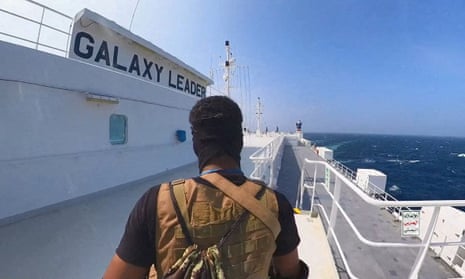Yemen's Houthi Terrorists Gaining an International Piracy Reputation
"While the U.S.-led coalition might appear successful militarily, it might not be sufficient for major shipping companies to resume Red Sea transits.""The longer the Houthi attacks continue, the more pressure the U.S. will face to go on the offensive, which risks regional escalation."Gerard DiPippo, senior geo-economic analyst, Bloomberg Economics"That's happening [clamber to track new arrival times for companies with cargo on detouring ships] en masse on every ship that got diverted.""Teams are working overtime right now to try to keep up with this."Ryan Petersen, chief executive and founder, Flexport Inc.
 |
| A Houthi fighter on the Galaxy Leader cargo ship, which was seized in the Red Sea, off Yemen’s west coast, in November. Photograph: Houthi Military Media/Reuters |
The situation has become so dire for shipping that half of the container-ship fleet normally transiting the Red Sea and Suez Canal on a regular basis now avoid the route as a result of the threat of attacks. New industry data tallied and compiled by Flexport Inc. indicate that 299 vessels with a combined capacity to carry 4.3 million containers have changed course or plan to. Double the number of a week earlier, equating to roughly 18 percent of global capacity.
According to Flexport, diverted journeys around Africa can take up to 25 percent longer in transit than the use of the Suez Canal shortcut between Asia and Europe. Trips that have greater cost will ultimately lead to higher prices on everything from footwear to food, to oil for consumers, should the need for these longer journeys persist. Yemen-based Houthis claim their targets are ships linked to Israel, leading them to the attacks. However, ships with no direct links to Israel also find themselves being targeted.
As the conflict escalates, global trade is threatened, leading to the formation of a United States-led task force attempting to increase security on the key regional waterway. Even ships that broadcast neutrality while using the route have come under attack. Flexport's statistics mirror another count by Swiss Freight-forwarder Kuehne + Nagel International AG that, as of December 27, show 364 vessels with capacity for five million, 20-foot container units rerouted around Africa.
:format(webp)/cdn.vox-cdn.com/uploads/chorus_image/image/72985575/1804440745.0.jpg) |
Houthis launched over 100 attacks on commercial ships in the past month alone. The MSC United VIII container ship en route to Pakistan from Saudi Arabia became a target on December 26, while fifteen container vessels -- ten operated by A.P. Moller-Maersk A/S -- have stayed on course or abandoned diversion plans, planning to cross into the Red Sea toward Suez, according to Flexport's analysis.
The number two container line, Maersk, is preparing to resume Red Sea transits "as soon as operationally possible". Not since pirates off the coast of Somalia some years back attacked commercial and international vessels has the world seen a situation parallel to the present one. Arrivals into the Gulf of Aden declined 40 percent between December 22 and December 26, according to Clarksons Research data, in comparison with the average for the first half of the month.
Data indicate that container ship arrivals decreased 87 percent, gas tankers down about 30 percent and car carriers about 25 percent. Suez Canal transits reflect a similar pattern where transits were down about 45 percent between December 22 and 26 for vessels heading south. Diversions around Africa's southern tip are stretching shipping capacity and boosting freight rates; the worst-case scenario is a 20 percent reduction in global capacity, reports Flexport.
 |
| Photo shows tanker and freight ships near the entrance of the Suez Canal, by Egypt’s Red Sea port city of Suez [AHMED HASAN/AFP via Getty Images] |
Labels: Houthi Terrorism, Iran's Influence on Red Sea Shipping, Oblique Attacks on Israel

0 Comments:
Post a Comment
<< Home